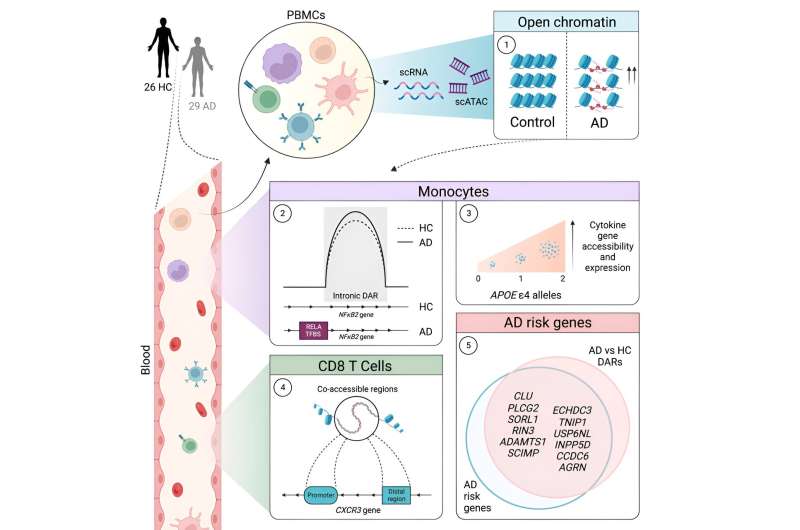Immune genes are altered in Alzheimer’s patients’ blood


A new Northwestern Medicine study has found the immune system in the blood of Alzheimer’s patients is epigenetically altered. That means the patients’ behavior or environment has caused changes that affect the way their genes work.
Many of these altered immune genes are the same ones that increase an individual’s risk for Alzheimer’s. Northwestern scientists theorize the cause could be a previous viral infection, environmental pollutants or other lifestyle factors and behaviors.
“It is possible that these findings implicate the peripheral immune response in Alzheimer’s disease risk,” said lead investigator David Gate, assistant professor of neurology at Northwestern University Feinberg School of Medicine. “We haven’t yet untangled whether these changes are reflective of brain pathology or whether they precipitate the disease.”
The study was published Feb. 9 in Neuron.
Previous research showed that many of the mutated genes putting a person at higher risk for Alzheimer’s are in the immune system. But scientists primarily studied the central immune system in the brain because Alzheimer’s is a brain disease. They have largely ignored the immune system in the blood, also known as the peripheral immune system.
Gate decided to study the blood. He and colleagues discovered every immune cell type in Alzheimer’s patients has epigenetic changes, indicated by open chromatin. Chromatin is the packaging of the DNA within cells. When chromatin is open—or exposed—the cells’ genome is vulnerable to alterations.
Then, Gate examined which genes are more open in these immune cells. He discovered that a receptor—CXCR3—on the T cells was more exposed. Gate believes CXCR3 functions like an antenna on T cells that allows the cells to enter the brain. T cells do not normally enter the brain because they can cause inflammation.
“The brain is emitting a signal that it is damaged, and the T cells are homing to that signal by their antenna, CXCR3,” Gate said.
“T cells can be very toxic in the brain, but we also don’t know if these cells might be attempting to repair the damage in the brain,” Gate said.
Gate also discovered epigenetic changes in inflammatory proteins in white blood cells called monocytes.
“Altogether, these findings indicate that immune function in Alzheimer’s patients is significantly altered,” Gate said. “It could be that environmental factors, like pollutants, or infections that a person has in their lifetime cause these epigenetic changes.”
The findings revealed several genes that may be therapeutic targets for manipulating the peripheral immune system. Next steps in the research are preclinical studies using in vitro culture systems and animal models to test these targets.
Other Northwestern authors include Abhirami Ramakrishnan, Natalie Piehl, Brooke Simonton, Milan Parikh, Ziyang Zhang, Victoria Teregulova and Lynn van Olst.
The title of the article is “Epigenetic dysregulation in Alzheimer’s disease peripheral immunity.”
More information:
Abhirami Ramakrishnan et al, Epigenetic dysregulation in Alzheimer’s disease peripheral immunity, Neuron (2024). DOI: 10.1016/j.neuron.2024.01.013
Northwestern University
Citation:
Immune genes are altered in Alzheimer’s patients’ blood (2024, February 10)
retrieved 21 March 2024
from
This document is subject to copyright. Apart from any fair dealing for the purpose of private study or research, no
part may be reproduced without the written permission. The content is provided for information purposes only.
link






